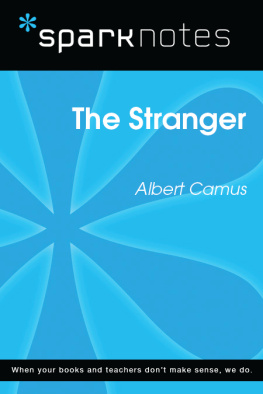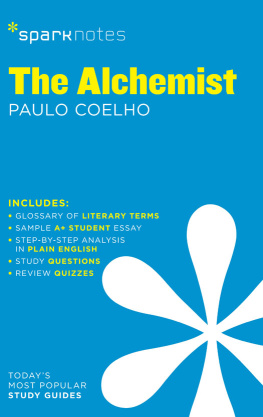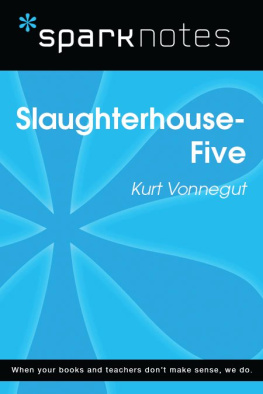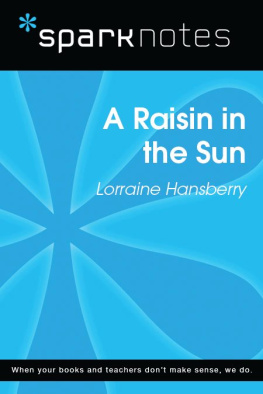The Stranger
Albert Camus
2003, 2007 by Spark Publishing
This Spark Publishing edition 2014 by SparkNotes LLC, an Affiliate of Barnes & Noble
All rights reserved. No part of this publication may be reproduced, stored in a retrieval system, or transmitted in any form or by any means (including electronic, mechanical, photocopying, recording, or otherwise) without prior written permission from the publisher.
Sparknotes is a registered trademark of SparkNotes LLC
Spark Publishing
A Division of Barnes & Noble
120 Fifth Avenue
New York, NY 10011
www.sparknotes.com /
ISBN-13: 978-1-4114-7854-1
Please submit changes or report errors to www.sparknotes.com.
10 9 8 7 6 5 4 3 2 1
Context
A lbert Camus was born on November , 1913 , in French colonial Algeria. In 1914 , his father was killed in World War I, at the Battle of the Marne. Albert, his mother, and his brother shared a two-bedroom apartment with the familys maternal grandmother and a paralyzed uncle. Despite his familys extreme poverty, Camus attended the University of Algiers, supporting his education by working a series of odd jobs. However, one of several severe attacks of tuberculosis forced him to drop out of school. The poverty and illness Camus experienced as a youth greatly influenced his writing.
After dropping out of the university, Camus eventually entered the world of political journalism. While working for an anti-colonialist newspaper, he wrote extensively about poverty in Algeria. From 1935 to 1938 , Camus ran the Thtre de lEquipe, an organization that attempted to attract working-class audiences to performances of great dramatic works. During World War II, Camus went to Paris and became a leading writer for the anti-German resistance movement. He was also the editor of Combat, an important underground newspaper.
While in wartime Paris, Camus developed his philosophy of the absurd. A major component of this philosophy was Camuss assertion that life has no rational or redeeming meaning. The experience of World War II led many other intellectuals to similar conclusions. Faced with the horrors of Hitlers Nazi regime and the unprecedented slaughter of the War, many could no longer accept that human existence had any purpose or discernible meaning. Existence seemed simply, to use Camuss term, absurd.
The Stranger, Camuss first novel, is both a brilliantly crafted story and an illustration of Camuss absurdist world view. Published in 1942 , the novel tells the story of an emotionally detached, amoral young man named Meursault. He does not cry at his mothers funeral, does not believe in God, and kills a man he barely knows without any discernible motive. For his crime, Meursault is deemed a threat to society and sentenced to death. When he comes to accept the gentle indifference of the world, he finds peace with himself and with the society that persecutes him.
Camuss absurdist philosophy implies that moral orders have no rational or natural basis. Yet Camus did not approach the world with moral indifference, and he believed that lifes lack of a higher meaning should not necessarily lead one to despair. On the contrary, Camus was a persistent humanist. He is noted for his faith in mans dignity in the face of what he saw as a cold, indifferent universe.
In 1942 , the same year that The Stranger was published, Camus also published The Myth of Sisyphus, his famous philosophical essay on the absurd. These two works helped establish Camuss reputation as an important and brilliant literary figure. Over the course of his career he produced numerous novels, plays, and essays that further developed his philosophy. Among his most notable novels are The Plague, published in 1947 , and The Fall, published in 1956 . Along with The Myth of Sisyphus, The Rebel stands as his best-known philosophical essay. In recognition of his contribution to French and world literature, Camus was awarded the Nobel Prize for Literature in 1957 . Tragically, he died in an automobile accident just three years later.
In the midst of the widespread intellectual and moral bewilderment that followed World War II, Camuss was a voice advocating the values of justice and human dignity. Though his career was cut short, he remains one of the most influential authors of the twentieth century, regarded both for the quality of his fiction and for the depth and insightfulness of his philosophy.
Camus, Existentialism & The Stranger
The Stranger is often referred to as an existential novel, but this description is not necessarily accurate. The term existentialism is a broad and far-reaching classification that means many different things to many different people, and is often misapplied or overapplied. As it is most commonly used, existentialism refers to the idea that there is no higher meaning to the universe or to mans existence, and no rational order to the events of the world. According to this common definition of existentialism, human life is not invested with a redemptive or affirming purposethere is nothing beyond mans physical existence.
Some ideas in The Stranger clearly resemble this working definition of existentialism, but the broader philosophy of existentialism includes aspects far beyond this definition that are not present in The Stranger. Moreover, Camus himself rejected the application of the existential label to The Stranger. Hence, this SparkNote approaches The Stranger from the philosophical perspective of the absurd. The absurd is a term Camus himself coined, and a philosophy that he himself developed. Reading The Stranger with Camuss philosophy of the absurd in mind sheds a good deal of light on the text.
Although Camuss philosophical ideas resonate strongly within the text, it is important to keep in mind that The Stranger is a novel, not a philosophical essay. When reading the novel, character development, plot, and prose style demand just as much attention as the specifics of the absurd. This SparkNote only discusses the absurd when such discussion provides insight on the text. Otherwise, the focus of this SparkNote remains on the text itself, as with any great work of literature.
Plot Overview
M eursault, the narrator, is a young man living in Algiers. After receiving a telegram informing him of his mothers death, he takes a bus to Marengo, where his mother had been living in an old persons home. He sleeps for almost the entire trip. When he arrives, he speaks to the director of the home. The director allows Meursault to see his mother, but Meursault finds that her body has already been sealed in the coffin. He declines the caretakers offer to open the coffin.
That night, Meursault keeps vigil over his mothers body. Much to his displeasure, the talkative caretaker stays with him the whole time. Meursault smokes a cigarette, drinks coffee, and dozes off. The next morning, before the funeral, he meets with the director again. The director informs him that Thomas Perez, an old man who had grown very close to Meursaults mother, will be attending the funeral service. The funeral procession heads for the small local village, but Perez has difficulty keeping up and eventually faints from the heat. Meursault reports that he remembers little of the funeral. That night, he happily arrives back in Algiers.
The next day, Meursault goes to the public beach for a swim. There, he runs into Marie Cardona, his former co-worker. The two make a date to see a comedy at the movie theater that evening. After the movie they spend the night together. When Meursault wakes up, Marie is gone. He stays in bed until noon and then sits on his balcony until evening, watching the people pass on the street.



















